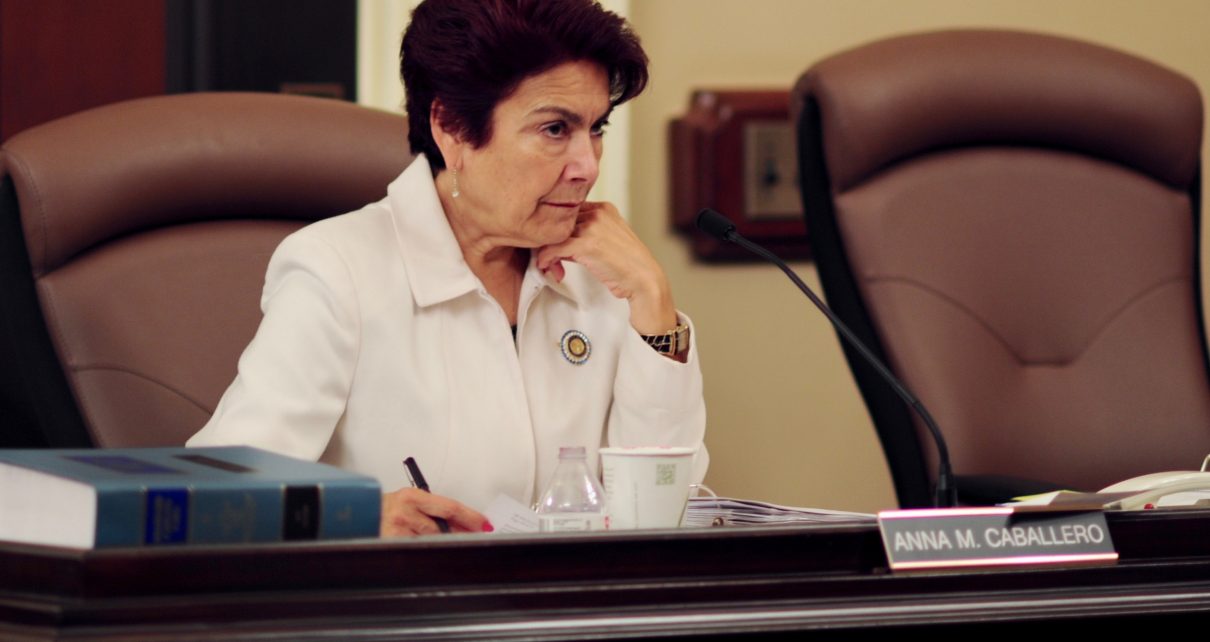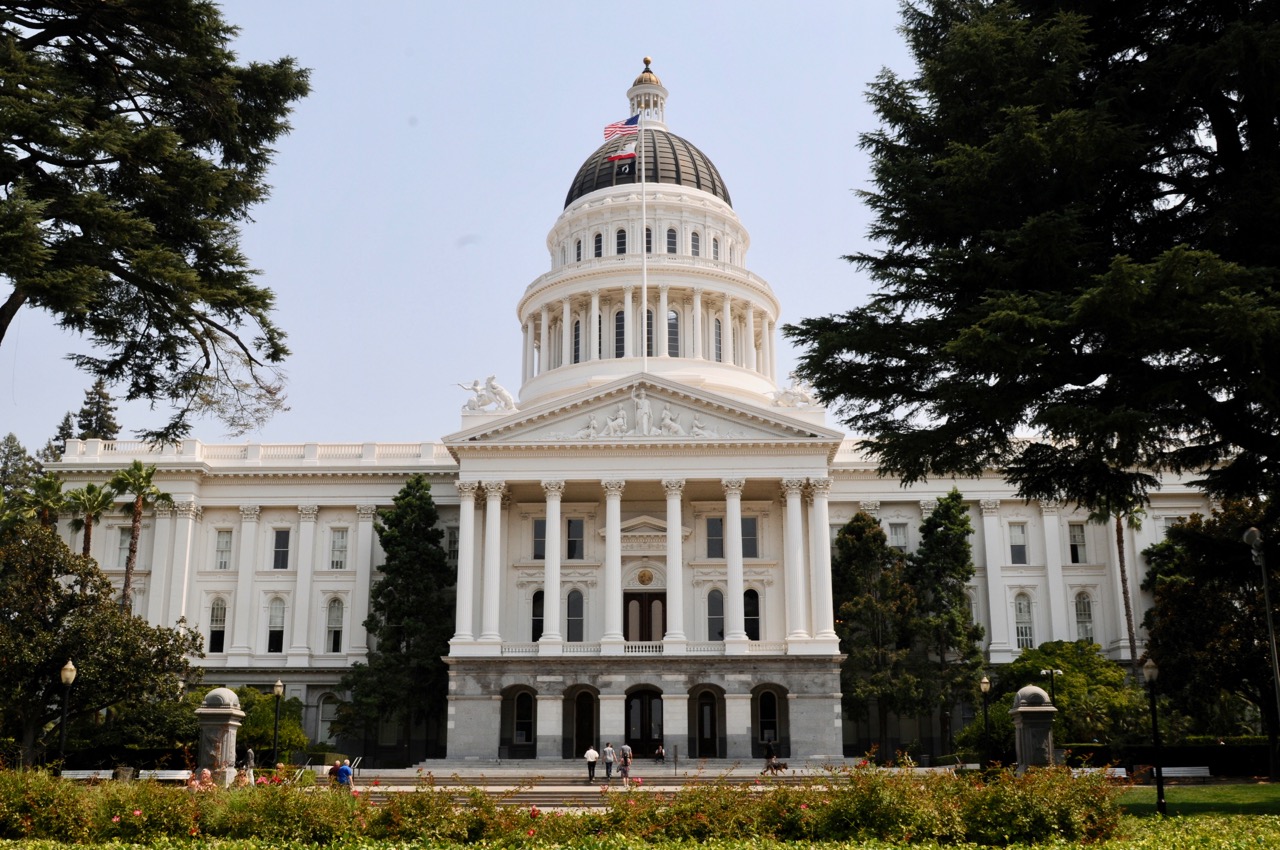
Sen. Anna M. Caballero. (Photo: Kevin Sanders for California Globe)
New ‘Early Action’ Budget Trailer Bill for California Small Business Relief
SB 87 would support continued operation of small businesses hit hard by COVID-19 shutdowns
By Chris Micheli, February 21, 2021 12:56 pm
On February 17, Senate Bill 87 was gutted and amended to be a budget trailer bill as part of the “early action” package. Senators Anna Caballero (D-Salinas) and Dave Min (D-Irvine) were made the joint authors of the bill.
SB 87 add and repeal Article 8 (commencing with Section 12100.80) of Chapter 1.6 of Part 2 of Division 3 of Title 2 of the Government Code, add and repeal Sections 17158 and 24312 of, and add and repeal Article 8 (commencing with Section 19294) of Chapter 5 of Part 10.2 of Division 2 of, the Revenue and Taxation Code.
Section One of the bill would add Article 8 to the Government Code and be titled “California Small Business COVID-19 Relief Grant Program.” The bill provides legislative findings and declarations regarding the impact of small businesses on the California economy and the disproportionate impact of COVID-19 pandemic on small businesses, particularly those owned by underserved groups. Despite federal stimulus and small business efforts to pivot, adapt to new health and safety guidance, and shift to online sales where feasible, many small businesses continue to face enormous risks to their survival.
The bill would provide definitions to the terms “applicant,” “California Small Business COVID-19 Relief Program” “CalOSBA,” “fiscal agent,” “qualified small business.” A qualified small business is a business or nonprofit whose status is confirmed by CalOSBA or a fiscal agent that the business has had revenue declines, other relief funds received, credit history, tax returns, and bank accounts to valid that they meet the criteria. The business must be a:
- sole proprietor
- independent contractor
- 1099 employee
- C-corporation
- S-corporation
- Cooperative
- limited liability company
- partnership, or
- limited partnership
The business or nonprofit must have an annual gross revenue of less than $2.5 million, but greater than $1,000, in the 2019 taxable year. The business or nonprofit must have begun operating prior to June 1, 2019, and must be currently active and operating, or has a clear plan to reopen when the state permits reopening of the business.
In addition, the entity must have been impacted by COVID-19 and the related health and safety restrictions, such as business interruptions or business closures incurred as a result of the COVID-19 pandemic. A qualified small business does not include those without a physical presence in the state, certain nonprofits, certain government entities, political or lobbying businesses, passive entities, financial institutions, and several others.
The bill also allows a grant to be recaptured if CalOSBA determines that the grantee has failed to meet the criteria for a qualified small business. The measure then would create the California Small Business COVID-19 Relief Grant Program within CalOSBA and the program would be under the direct authority of the director.
The program’s purpose is to provide grants to qualified small businesses affected by COVID-19 in order to support their continued operation. And the office will allocate grants to qualified small businesses that meet the requirements of this new law. The office must also conduct marketing and outreach for equitable awareness and the distribution of grants, including specified actions.
Grants would have to be prioritized, to the extent permissible under state and federal equal protection laws, in accordance with specified criteria, including geographic distribution and industry sectors most impacted by the pandemic, as well as nonprofit missions, underserved small business groups, and disadvantaged communities.
The grants to qualified small business would have to be awarded in a minimum of three rounds. These rounds would be based on grant amounts for different business sizes based upon their annual gross revenue. A closed round for existing applicants would also be allowed. And, $50 million of program funds will be allocated in one round to eligible nonprofit cultural institutions, which are defined in the bill.
Grant moneys awarded are to only be used for costs resulting from the COVID-19 pandemic and related health and safety restrictions, or business interruptions or closures incurred as a result of the COVID-19 pandemic, including items such as employee expenses, working capital and overhead, reopening costs, and compliance costs. The office will be required to publicly disclose, by legislative district, the actual award information based upon specified criteria. This section of the law will remain in effect through 2023.
Section Two of the bill would add Revenue and Taxation Code Section 17158, which is in the Personal Income Tax Law, to exclude from gross income specified grant allocations for tax years 2020 through 2029. Section Three of the bill would add Article 8, which would be titled “Collection of Recaptured California Small Business COVID-19 Relief Grants.” CalOSBA would be required to provide the Franchise Tax Board a list of grantees and their respective recaptured grant amounts as approved, in whole or in part, by CalOSBA. This section of law would remain in effect only until through November 2030.
Section Four of the bill would add Revenue and Taxation Code Section 24312, which is in the Corporate Tax Law, to exclude from gross income specified grant allocations for tax years 2020 through 2029. Section Five of the bill would appropriate $2.075 billion to the Golden State Stimulus Emergency Fund. Upon direction by GO-Biz, the state Controller would be required to transfer moneys from this Fund to the Office of Small Business Advocate for the California Small Business COVID-19 Relief Grant Program, of which $50 million would be allocated for eligible nonprofit cultural institutions.
Section Seven of the bill includes a legislative finding and declaration that the California Small Business COVID-19 Relief Grant Program authorized under this bill serves the public purpose of preventing revenue decreases, closures, and higher unemployment across the state due to the COVID-19 pandemic, and does not constitute a gift of public funds. This statement is required because of the retroactive tax benefits that would be provided under the law.
This bill is expected to be adopted next week.
- Hearings on Third-party Claims - February 18, 2026
- Cullen Earthquake Act - February 17, 2026
- Encumbrances in Eminent Domain - February 17, 2026





I have my own small business relief bill ready to go and it is guaranteed 100% effective. Fire all the Demoncrats.
Works for me, CW!
Reading this I feel like I’m being strangled to death and I don’t even own a business. These Dem legislators just LOVE jerking people around all day and all night.
Open up the state for business!
Works for me too! How did we go from a functioning society to needing billions of dollars and Gavin’s permission to get back to an “open” society from a virus with over a 99% survival rate??? Like you showantell I feel strangled!
Showandtell, can you tell me what generation your from? I am curious with our like minds on political topics if we are from the same era?
Stacy: I won’t say, but I suspect we are contemporaries. Probably enough that we are like-minded, so important and helpful in this nutty state, ha.
The Dimocrats CAUSED all these economic problems with their emotionally overwrought fear-basd response to the CCP virus…
Now they want to fix what they caused with more over-regulation and controls???
Why do you vote for them. again?
Classic Demoncrat. First create a problem and then “solve” it. The solution is always worse than the problem.